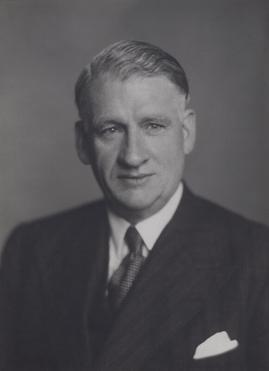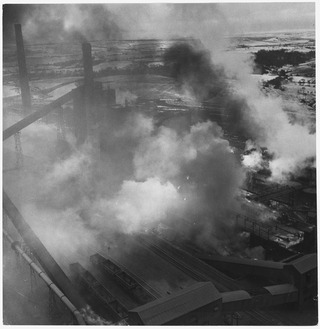
British Steel was a major British steel producer. It originated from the nationalised British Steel Corporation (BSC), formed in 1967, which was privatised as a public limited company, British Steel plc, in 1988. It was once a constituent of the FTSE 100 Index. The company merged with Koninklijke Hoogovens to form Corus Group in 1999.
GKN Ltd is a British multinational automotive and aerospace components business headquartered in Redditch, England. It is a long-running business known for many decades as Guest, Keen and Nettlefolds. It can trace its origins back to 1759 and the birth of the Industrial Revolution.

The National Coal Board (NCB) was the statutory corporation created to run the nationalised coal mining industry in the United Kingdom. Set up under the Coal Industry Nationalisation Act 1946, it took over the United Kingdom's collieries on "vesting day", 1 January 1947. In 1987, the NCB was renamed the British Coal Corporation, and its assets were subsequently privatised.
In corporate governance, codetermination is a practice where workers of an enterprise have the right to vote for representatives on the board of directors in a company. It also refers to staff having binding rights in work councils on issues in their workplace. The first laws requiring worker voting rights include the Oxford University Act 1854 and the Port of London Act 1908 in the United Kingdom, the Act on Manufacturing Companies of 1919 in Massachusetts in the United States, and the Supervisory Board Act 1922 in Germany, which codified collective agreement from 1918.

The Aircraft and Shipbuilding Industries Act 1977 is an Act of the Parliament of the United Kingdom that nationalised large parts of the UK aerospace and shipbuilding industries and established two corporations, British Aerospace and British Shipbuilders (s.1).

Clement Attlee was invited by King George VI to form the Attlee ministry in the United Kingdom in July 1945, succeeding Winston Churchill as Prime Minister of the United Kingdom. The Labour Party had won a landslide victory at the 1945 general election, and went on to enact policies of what became known as the post-war consensus, including the establishment of the welfare state and the nationalisation of some industries. The government's spell in office was marked by post-war austerity measures, the violent crushing of pro-independence and communist movements in Malaya, the grant of independence to India, the engagement in the Cold War against Soviet Communism as well as the creation of the country's National Health Service (NHS).

The Electricity Act 1947 was an Act of the Parliament of the United Kingdom which nationalised, or bought into state control, the electricity supply industry in Great Britain. It established a central authority called the British Electricity Authority (BEA) to own and operate all public electricity generation and transmission facilities and created 14 area electricity boards with a duty to acquire bulk supplies of electricity from the central authority and to distribute and sell electricity economically and efficiently to industrial, commercial and domestic consumers. It vested 505 separate local authority and company owned electricity undertakings in the BEA with effect from 1 April 1948. The Electricity Act 1947 is one of a number of Acts promulgated by the post-war Labour government to nationalise elements of the UK’s industrial infrastructure; other Acts include the Coal Industry Nationalisation Act 1946; Transport Act 1947 ; Gas Act 1948; and Iron and Steel Act 1949.

Alfred Edwards was a British politician who served for fifteen years as a Member of Parliament (MP). His origins were as a company director in the foundry industry in Middlesbrough, which led him into conflict with the Labour Party when it proposed to nationalise the iron and steel industries; profoundly unable to support the party, he crossed the floor and became an active Conservative Party supporter.
The Iron and Steel Corporation of Great Britain was a nationalised industry, set up in 1949 by Clement Attlee's Labour government.

The Consett Iron Company Ltd was an industrial business based in the Consett area of County Durham in the United Kingdom. The company owned coal mines and limestone quarries, and manufactured iron and steel. It was registered on 4 April 1864 as successor to the Derwent & Consett Iron Company Ltd. This in turn was the successor to the Derwent Iron Company, founded in 1840.

The Ravenscraig steelworks, operated by Colvilles and from 1967 by British Steel Corporation, consisted of an integrated iron and steel works and a hot strip steel mill. They were located in Motherwell, North Lanarkshire, Scotland.

The Coal Industry Nationalisation Act of 1946 was an Act of the Parliament of the United Kingdom which nationalised, or brought into state control, the coal industry in the United Kingdom. It established the National Coal Board as the managing authority for coal mining and coal processing activities. It also initially provided for the establishment of consumers' councils. The Coal Industry Nationalisation Act 1946 was the first of a number of Acts promulgated by the post-war Labour government to nationalise elements of the UK's industrial infrastructure; other Acts include the Electricity Act 1947; the Transport Act 1947 ; the Gas Act 1948; and the Iron and Steel Act 1949.
The area gas boards were created under the provisions of the Gas Act 1948 enacted by Clement Attlee's post-war Labour government. The Act nationalised the British gas industry and also created the Gas Council.
Industrial democracy is an arrangement which involves workers making decisions, sharing responsibility and authority in the workplace. While in participative management organizational designs workers are listened to and take part in the decision-making process, in organizations employing industrial democracy they also have the final decisive power.

The Gas Act 1948 was an Act of the Parliament of the United Kingdom which nationalised, or bought into state control, the gas making and supply industry in Great Britain. It established 12 area gas boards to own and operate all public gas-making, distribution and sales facilities and created a central authority: the Gas Council. It vested the existing local authority and company-owned gas undertakings into the area boards with effect from 1 May 1949. The Gas Act 1948 was one of a number of Acts promulgated by the post-war Labour government to nationalise elements of the UK's industrial infrastructure; other Acts include the Coal Industry Nationalisation Act 1946; the Electricity Act 1947; Transport Act 1947 ; and the Iron and Steel Act 1949.
Worker representation on corporate boards of directors, also known as board-level employee representation (BLER) refers to the right of workers to vote for representatives on a board of directors in corporate law. In 2018, a majority of Organisation for Economic Co-operation and Development, and a majority of countries in the European Union, had some form of law guaranteeing the right of workers to vote for board representation. Together with a right to elect work councils, this is often called "codetermination".
The Gas Council was a UK government body that provided strategic oversight of the gas industry in England, Wales and Scotland between 1949 and 1972.

The Iron and Steel Act 1949 was an Act of the Parliament of the United Kingdom which nationalised, or bought into state control, elements of the iron and steel industry in Great Britain. It established an Iron and Steel Corporation which acquired certain iron and steel companies. In a departure from earlier nationalisations the Corporation only acquired the share capital of the companies, not the undertakings themselves. The individual companies continued to operate under management Boards appointed by the corporation. The Iron and Steel Act 1949 was one of a number of Acts promulgated by the post-war Labour government to nationalise elements of the UK's industrial infrastructure; other Acts include the Coal Industry Nationalisation Act 1946; the Electricity Act 1947; Transport Act 1947 ; and the Gas Act 1948.
The Iron and Steel Board was a governmental body, originally established in 1946, to supervise the work and development of the United Kingdom iron and steel industry. It was reestablished in 1953 and was abolished in 1967.








